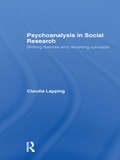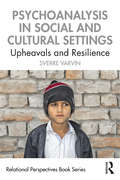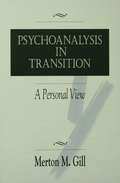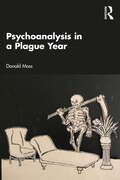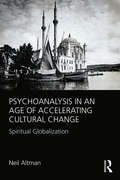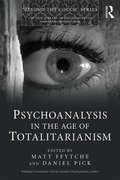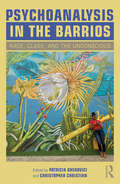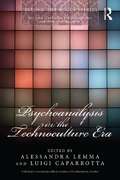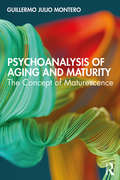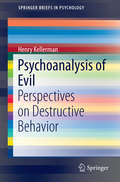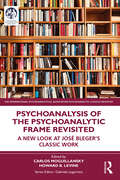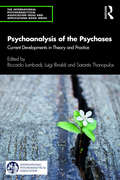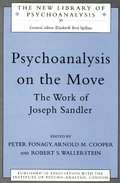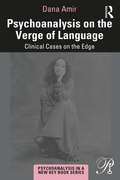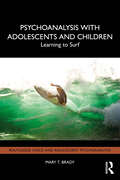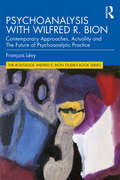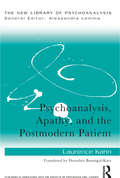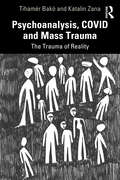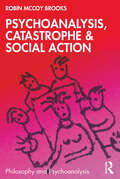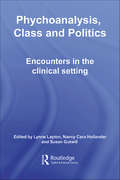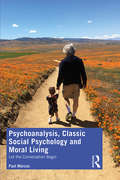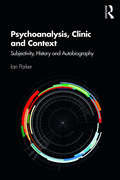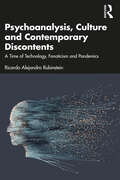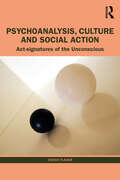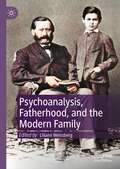- Table View
- List View
Psychoanalysis in Social Research: Shifting theories and reframing concepts
by Claudia LappingThe use of psychoanalytic ideas to explore social and political questions is not new. Freud began this work himself and social research has consistently drawn on his ideas. This makes perfect sense. Social and political theory must find ways to conceptualise the relation between human subjects and our social environment; and the distinctive and intense observation of individual psychical structuring afforded within clinical psychoanalysis has given rise to rich theoretical and methodological resources for doing just this. However, psychoanalytic concepts do not remain the same when they are rearticulated in the context of research. This book traces the reiteration and transformation of concepts in the psychoanalytic theory of Freud, Klein and Lacan, the social theory of Butler, Derrida, Foucault, Laclau and Zizek, and case studies of empirical research ranging from the classic Tavistock Institute studies to contemporary work in politics, gender studies, cultural studies and education. Each chapter explores one cluster of concepts: Melancholia, loss and subjectivity Overdetermination and free association Resistance, reflexivity and the compulsion to repeat Repression, disavowal and foreclosure Psychic defenses and social defenses Arguing against the reification of psychoanalytic concepts, Claudia Lapping suggests the need for a reflexive understanding of the play of attachments and substitutions as concepts are reframed in the contrasting activities of psychoanalysis and research.
Psychoanalysis in Social and Cultural Settings: Upheavals and Resilience (Relational Perspectives Book Series)
by Sverre VarvinPsychoanalysis in Social and Cultural Settings examines the theory and practice of psychoanalysis with patients who have experienced deeply traumatic experiences through war, forced migrations, atrocities and other social and cultural dislocations. The book is divided into three main sections covering terrorism, refugees and traumatisation, with another two focusing specifically on transcultural issues regarding establishing psychoanalysis in China and on research related to themes outlined in the book. Major key psychoanalytic themes run through the work, focusing on identity and the self, fundamentalism, resilience, dehumanisation, cultural differences and enactment. Offering key theory and clinical guidance for working with highly traumatised patients, this book will be essential for all psychoanalysts and therapists working with victims of terrorism, war and other deeply traumatic life events.
Psychoanalysis in Transition: A Personal View
by Merton M. GillFirst published in 2000. Routledge is an imprint of Taylor & Francis, an informa company.
Psychoanalysis in a Plague Year
by Donald MossSelecting one sentence from each session every day, Donald Moss has recorded the words spoken by his patients during one year of ‘Covid-time’. The patients conjure a moving mixture of the mundane and extraordinary, giving readers a perspective on psychoanalytic practice and treatment during the COVID-19 pandemic. Clustered together in ways akin to poetic verse, these sentences preserve the mood of the analyst’s working day, reflecting the common ground shared by analyst and patient in these unprecedented times. Pandemic-related concerns and everyday problems are seen to persist in these extreme circumstances, affording the reader clinical insights into the daily life of contemporary psychoanalysts. With a clear preface from the author and a remarkable foreword by Timothy J. Clark, the book is grounded in a contemporary psychoanalytic context. An insightful companion into psychoanalytic practice, the book will interest therapists and analysts in training and in practice, as well as readers intrigued by what happens behind the closed doors of the consulting room.
Psychoanalysis in an Age of Accelerating Cultural Change: Spiritual Globalization
by Neil AltmanPsychoanalysis in an Age of Accelerating Cultural Change: Spiritual Globalization addresses the current status of mental health work in the public and private sectors. The careful, thorough, approach to the individual person characteristic of psychoanalysis is mostly the province of an affluent few. Meanwhile, community-based mental health treatment, given shrinking budgets, tends to emphasize medication and short-term therapies. In an increasingly diverse society, considerations of culture in mental health treatment are given short shrift, despite obligatory nods to cultural competence. The field of mental health has suffered from the mutual isolation of psychoanalysis, community-based clinical work, and cultural studies. Here, Neil Altman shows how these areas of study and practice require and enrich each other - the field of psychoanalysis benefits by engaging marginalized communities; community-based clinical work benefits from psychoanalytic concepts, while all forms of clinical work benefit from awareness of culture. Including reports of clinical experiences and programmatic developments from around the world, its international scope explores the operation of culture and cultural differences in conceptions of mental health. In addition the book addresses the origin and treatment of mental illness, from notions of spirit possession treated by shamans, to conceptions of psychic trauma, to biological understandings and pharmacological treatments. In the background of this discussion is globalization, the impact of which is tracked in terms of its psychological effects on people, as well as on the resources and programs available to provide psychological care around the world. As a unique examination of current mental health work, this book will appeal to psychoanalysts, psychotherapists, community-based mental health workers, and students in Cultural Studies. Neil Altman is a psychoanalytic psychologist, Visiting Professor at Ambedkar University of Delhi, India, and faculty and supervisor at the William Alanson White Institute. He is an Honorary Member of the William Alanson White Society and Editor Emeritus of Psychoanalytic Dialogues. Author of The Analyst in the Inner City: Race, Class, and Culture through a Psychoanalytic Lens (Routledge, 2nd edition, 2010)
Psychoanalysis in the Age of Totalitarianism (The New Library of Psychoanalysis 'Beyond the Couch' Series)
by Matt Ffytche Daniel PickPsychoanalysis in the Age of Totalitarianism provides rich new insights into the history of political thought and clinical knowledge. In these chapters, internationally renowned historians and cultural theorists discuss landmark debates about the uses and abuses of ‘the talking cure’ and map the diverse psychologies and therapeutic practices that have featured in and against tyrannical, modern regimes. These essays show both how the Freudian movement responded to and was transformed by the rise of fascism and communism, the Second World War, and the Cold War, and how powerful new ideas about aggression, destructiveness, control, obedience and psychological freedom were taken up in the investigation of politics. They identify important intersections between clinical debate, political analysis, and theories of minds and groups, and trace influential ideas about totalitarianism that took root in modern culture after 1918, and still resonate in the twenty-first century. At the same time, they suggest how the emergent discourses of ‘totalitarian’ society were permeated by visions of the unconscious. Topics include: the psychoanalytic theorizations of anti-Semitism; the psychological origins and impact of Nazism; the post-war struggle to rebuild liberal democracy; state-funded experiments in mind control in Cold War America; coercive ‘re-education’ programmes in Eastern Europe, and the role of psychoanalysis in the politics of decolonization. A concluding trio of chapters argues, in various ways, for the continuing relevance of psychoanalysis, and of these mid-century debates over the psychology of power, submission and freedom in modern mass society. Psychoanalysis in the Age of Totalitarianism will prove compelling for both specialists and readers with a general interest in modern psychology, politics, culture and society, and in psychoanalysis. The material is relevant for academics and post-graduate students in the human, social and political sciences, the clinical professions, the historical profession and the humanities more widely.
Psychoanalysis in the Barrios: Race, Class, and the Unconscious
by Patricia Gherovici Christopher ChristianPsychoanalysis in the Barrios: Race, Class, and the Unconscious demonstrates that psychoanalytic principles can be applied successfully in disenfranchised Latino populations, refuting the misguided idea that psychoanalysis is an expensive luxury only for the wealthy. As opposed to most Latin American countries, where psychoanalysis is seen as a practice tied to the promotion of social justice, in the United States psychoanalysis has been viewed as reserved for the well-to-do, assuming that poor people lack the "sophistication" that psychoanalysis requires, thus heeding invisible but no less rigid class boundaries. Challenging such discrimination, the authors testify to the efficacy of psychoanalysis in the barrios, upending the unfounded widespread belief that poor people are so consumed with the pressures of everyday survival that they only benefit from symptom-focused interventions. Sharing vivid vignettes of psychoanalytic treatments, this collection sheds light on the psychological complexities of life in the barrio that is often marked by poverty, migration, marginalization, and barriers of language, class, and race. This interdisciplinary collection features essays by distinguished international scholars and clinicians. It represents a unique crossover that will appeal to readers in clinical practice, social work, counselling, anthropology, psychology, cultural and Latino studies, queer studies, urban studies, and sociology.
Psychoanalysis in the Technoculture Era (The New Library of Psychoanalysis 'Beyond the Couch' Series)
by Alessandra Lemma Luigi CaparrottaAlessandra Lemma - Winner of the Levy-Goldfarb Award for Child Psychoanalysis! By now the internet and other forms of virtual communication have been in place for at least twenty years. However, surprisingly little has been written about the use of new technologies in the psychoanalytical literature. As such, Psychoanalysis in the Technoculture Era is a timely exposition on the subject of both virtual and analytic space. Bringing together the work of several psychoanalysts, the Editors Alessandra Lemma and Luigi Caparrotta illustrate how new technologies have become an integral part of our everyday lives and how they have silently and subtly permeated the psychoanalytic setting. The contributors explore how new technologies have affected psychoanalytic practice and discuss the advantages and disadvantages of its use. Psychoanalysis in the Technoculture Era unravels some of the meanings of virtual world terms, and opens this field to greater scrutiny, stimulating and promoting discussion about new technologies in psychoanalytic practice. This book will be of interest to the psychoanalytic community including psychotherapy professionals, psychoanalysts, post graduate, graduate and undergraduate students.
Psychoanalysis of Aging and Maturity: The Concept of Maturescence
by Guillermo Julio MonteroAs developing countries increasingly confront the issues of an aging population, this important book identifies the key period in the life cycle in which changes to the body, as well as concomitant psychological developments, result in the entering of a new phase of life, maturescence. The author defines the metapsychology of maturescence from a psychoanalytic standpoint, detaching it from the concepts of midlife and middle age. Supported by clinical examples, the book defines the stimuli which are the precursors to this phase, before examining the complete set of psychological challenges it entails. The author also highlights how maturescence has been illustrated in key literary figures in the 20th century and draws parallels with the mythical cycle of the hero. This fascinating and original book will be essential reading for psychoanalysts, psychotherapists and any professional working with issues around aging.
Psychoanalysis of Evil
by Henry KellermanFor all our knowledge of psychopathology and sociopathology--and despite endless examinations of abuse and torture, mass murder and genocide--we still don't have a real handle on why evil exists, where it derives from, or why it is so ubiquitous. A compelling synthesis of diverse schools of thought, Psychoanalysis of Evil identifies the mental infrastructure of evil and deciphers its path from vile intent to malignant deeds. Evil is defined as manufactured in the psyche: the acting out of repressed wishes stemming from a toxic mix of harmful early experiences such as abuse and neglect, profound anger, negative personality factors, and mechanisms such as projection. This analysis brings startling clarity to seemingly familiar territory, that is, persons and events widely perceived as evil. Strongly implied in this far-reaching understanding is a call for more accurate forms of intervention and prevention as the author: Reviews representations of evil from theological, philosophical, and psychoanalytic sources. Locates the construction of evil in psychodynamic aspects of the psyche. Translates vague abstractions of evil into recognizable concepts. Exemplifies this theory with the lives and atrocities of Hitler and Stalin. Applies psychoanalytic perspective to the genocides in Turkey, Pakistan, Cambodia, and Rwanda. Revisits Hannah Arendt's concept of "the banality of evil. " Psychoanalysis of Evil holds a unique position in the literature and will gather considerable interest among readers in social psychology, psychoanalysis, sociology, and political anthropology. Historians of mass conflict should find it instructive as well.
Psychoanalysis of the Psychoanalytic Frame Revisited: A New Look at José Bleger’s Classic Work (The International Psychoanalytical Association Psychoanalytic Classics Revisited)
by Carlos MoguillanskyPsychoanalysis of the Psychoanalytic Frame Revisited provides an in-depth discussion of José Bleger’s work, broadening current knowledge and focusing on his significant contribution to psychoanalytic thinking. This work should prove especially relevant in considering the implications of changes in the treatment setting forced by the Covid pandemic. This edited collection proposes a current debate on José Bleger's ideas on the psychoanalytic setting. The contributors here provide a broad overview of current discussions about the analytic setting, its clinical expressions and its technical management, engaging and transforming the concept of "encuadre" (frame). The book covers topics including early experiences, the psychoanalytic setting, symbiosis and applications in a pandemic. A common thread, Bleger's brilliant intuition, runs through the book, and the tense relationship between the frame and the figure maintains its dynamics throughout. Psychoanalysis of the Psychoanalytic Frame Revisited will be of great interest to psychoanalysts in practice and in training, as well as anyone seeking to understand the work of José Bleger.
Psychoanalysis of the Psychoses: Current Developments in Theory and Practice (The International Psychoanalytical Association Psychoanalytic Ideas and Applications Series)
by Riccardo Lombardi Luigi Rinaldi Sarantis ThanopulosPsychoanalysis of the Psychoses brings together a distinguished international set of contributors, offering a range of views and approaches, to explore the latest thinking in the psychoanalytic treatment of psychosis and related disorders. Drawing on findings from neuroscience, theory and clinical material from many schools of psychoanalytic thought, this book offers a comprehensive guide to understanding how psychosis is conceptualised from a psychoanalytic perspective. It looks at how to work with psychotic patients, typical problems in treating psychosis and the role of pharmacology. It demonstrates the relational dimension, capable of strengthening the patient’s observing Ego and facilitating the integration of the different areas of the personality. This process can identify and work through the main psychological stress factors involved in psychotic disturbances, transforming chaotic thoughts into springboards for important insights, and offering patients the precious chance to construct for the first time a creative relationship with their own existence. Psychoanalysis of the Psychoses will be of great interest to psychoanalysts and psychoanalytic psychotherapists as well as psychiatrists wishing to draw upon psychoanalytic ideas in their work.
Psychoanalysis on the Move: The Work of Joseph Sandler (The New Library of Psychoanalysis #Vol. 35)
by Peter Fonagy Arnold M. Cooper Robert S. WallersteinPeter Fonagy Winner of the 2010 Sigourney Award! Joseph Sandler has been an important influence in psychoanalysis throughout the world during the latter part of the twentieth century, contributing to changing views on both psychoanalytic theory and technique. He has also been a bridging force in psychoanalysis, helping to close the gap between American ego psychologists, and British Kleinian and object relations theorists. Psychoanalysis on the Move provides a comprehensive and accessible overview of Sandler's contribution to the development of psychoanalysis. The contributors trace the development of the main themes and achievements of Sandler's work, in particular his focus on combining psychoanalytic theory and clinical practice. Timely and important, Psychoanalysis on the Move should make interesting reading for psychoanalysts, psychotherapists, and all those who wish to know more about one of the most creative figures in psychoanalysis of the past few decades.
Psychoanalysis on the Verge of Language: Clinical Cases on the Edge (Psychoanalysis in a New Key Book Series)
by Dana AmirThis book examines the importance of language and writing in psychoanalytic theory and practice, offering an understanding of how language works can give a deeper insight into the psyche both in clinical practice and everyday life. Bringing together psychoanalytic insights that hinge on the language of "difficult cases", this collection also includes contributions dedicated to meta-study of psychoanalytic writing. The first chapter shows how music includes tonal regions that deploy existing rules and syntax, alongside atonal ones dominated by caesuras, pauses, and tensions. The second chapter discusses the malignant ambiguity of revealing and concealing typical of incestuous situations, pinpointing how the ambiguous language of incest "deceives by means of the truth,". The third chapter brings in Virginia Woolf’s character Orlando in order to illustrate two types of gender crossing. Distinctions defined by the linguist Roman Jakobson help in the fourth chapter to offer an integrative description of obsessive-compulsive phenomenon as an interaction between metaphoric and metonymic dimensions, as well as with a third, psychotic dimension. The fifth chapter focuses on what is called the "screen confessions" typical of the perpetrator’s language. George Orwell’s "newspeak" is used here to decipher the specific means by which the perpetrator turns his or her "inner witness" into a blind one. The final chapter uses Roland Barthes’ concepts of "studium" and "punctum" to discuss the limits of psychoanalytic writing. As a whole, this book sets the psychoanalytic importance of language in a wider understanding of how language helps to shape and even create internal as well as the external world. Drawing on insights from psychoanalytic theory and practice, as well as from linguistics and cultural theory, this book will be invaluable for psychoanalysts, psychoanalytic psychotherapists and bibliotherapists, as well as anyone interested in how language forms our reality.
Psychoanalysis with Adolescents and Children: Learning to Surf (Routledge Child and Adolescent Psychoanalysis)
by Mary T. BradyIn Psychoanalysis with Adolescents and Children: Learning to Surf, Mary T. Brady expertly guides the reader through the challenging and vital process of working with young analysands.Brady likens the experience to ‘learning to surf.’ While finding Bion’s metaphor that the analyst must be able to ‘think under fire’ useful, she suggests ‘learning to surf’ is more apt in psychoanalysis with adolescents and children. Drawing on this metaphor throughout the volume, she describes how the adolescent can be potentially upended, injured or even killed by emotional waves too tumultuous to manage. Surfing also evokes the often uneasy but sometimes thrilling balances of adolescence. Using clinical vignettes from her extensive experience in the field, Brady explores how to work with young people experiencing issues such as eating disorders, gender challenges, parental substance abuse and the impact of the COVID-19 pandemic. Drawing on Bionian Field Theory, as well as the work of Donald Winnicott, she explores how analysts can surf with the adolescent or child in navigating the ebb and flow of psychic life and development.This book is essential reading for psychoanalysts and psychotherapists, including psychiatrists, psychologists, therapists and counselors, who treat children and adolescents.
Psychoanalysis with Wilfred R. Bion: Contemporary Approaches, Actuality and The Future of Psychoanalytic Practice (The Routledge Wilfred R. Bion Studies Book Series)
by François LévyPsychoanalysis with Wilfred R. Bion is the product of François Lévy’s efforts over a period of twenty years to represent clearly the classical elements and the innovatory propositions of the thought and work of Bion, who offers both new and modified ways of practising and thinking about the psychoanalytic experience. Bion’s thought, methodical and intuitive, gave rise to profound modifications in the approach to the psychology of groups, clinical work with psychoses, and the conception of the genesis of thought. Some of his original notions – psychic growth, processes of thinking, transformations, alpha function, maternal reverie – constitute valuable tools for rethinking psychoanalytic practice. This book places Bion’s thought within a filiation that is faithful to those of Sigmund Freud and Melanie Klein. It shows the parallels that exist between Bion’s formalisations and those of Lacan. It also lays emphasis on the mechanisms of thought arising from the negative (André Green), from logic (Lewis Carroll), from causalist philosophy (David Hume), from literature (Milton, Blanchot) and from the physical sciences (Stephen Hawking). Finally, Lévy underlines the importance of placing individuals within the collective from which they have originated. Psychoanalysis with Wilfred R. Bion will appeal to psychoanalysts and psychoanalytic psychotherapists looking to draw on the ideas of one of the most important and influential figures in the history of psychoanalysis.
Psychoanalysis, Apathy, and the Postmodern Patient (New Library of Psychoanalysis)
by Laurence KahnThe postmodern turn underlies a new development in psychoanalysis, which has theoretical and practical implications. Psychoanalysis, Apathy, and the Postmodern Patient involves a detailed reading of the main psychoanalytic texts that mark out this extended development, along with a critical examination of the changes in the major Freudian concepts. At stake are the tenets of infantile sexuality, ‘psychic reality,’ unconscious determinism, the fulfilment of unconscious desire, and free association. In this book, Laurence Kahn sets out a critique of postmodern psychoanalysis, via a theoretical and clinical discussion that tackles the place of metapsychology and the question of the scientific status of psychoanalysis. Starting from Freud’s own work, she considers such key topics as the analyst’s objectivity, the relevance of self-disclosure, the complex influence of French postmodern theorists, and the role of empathy in psychoanalytic technique. In so doing, she offers a perspective on psychoanalytic thought and practice that exposes the insidious taming of the Freudian model in favour of a 'humanistic' and 'dialogic' approach that obliterates the radical otherness of the unconscious. Coming from a powerful voice in the contemporary French psychoanalytic tradition, Psychoanalysis, Apathy, and the Postmodern Patient is a bold celebration of psychoanalysis that will be of great interest to psychoanalysts and psychoanalytic psychotherapists, as well as philosophers and historians of thought.
Psychoanalysis, COVID and Mass Trauma: The Trauma of Reality
by Tihamér Bakó Katalin ZanaConstructed as a psychoanalytic diary, the authors of this book reflect on clinical observations from their work with patients during the COVID-19 pandemic, tracking these singular experiences to arrive at broader understanding of the psychological characteristics of collective trauma. Based on the theoretical framework of their previous book, which focuses on the transgenerational, psychological effects of large-scale social-historical traumas and introduced new concepts such as the "Transgenerational Atmosphere," the authors here explore the trauma itself, especially those deep traumas which affect a large group of people or even the whole of humanity, including pandemics, natural disasters, terrorism, and war. In this volume, the authors progress toward the potential immediate and long-term psychological effects of such trauma, including the possibility of the activation of unprocessed transgenerational traumatic experiences, but also the potential for growth. Rich in clinical material and methodological suggestions, this book will appeal to mental health professionals, including psychiatrists, psychologists, psychoanalysts, and social workers, in addition to professors in other academic disciplines such as sociology, history, philosophy, and anthropology.
Psychoanalysis, Catastrophe & Social Action (Philosophy and Psychoanalysis)
by Robin McCoy BrooksThis fascinating volume uses psychoanalytic theory to explore how political subjectivity comes about within the context of global catastrophe, via the emergence of collective individuations through trans-subjectivity. Serving as a jumping-off point to address the structural linkage between collective catastrophe, subject, group, and political transformation, trans-subjectivity is the central tenet of the book, conceptualized as a psyche-social dynamic that initiates social transformation and which may be enhanced in the clinical setting. Each chapter investigates a distinct manifestation of trans-subjectivity in relation to various real-world events as they manifest clinically in the analytic couple and within group processes. The author builds her conceptual arguments through a psyche/social reading of Kristeva’s theory of signifiance (sublimation), Lacan’s 1945 essay on collective logic, Heidegger’s secular reading of the apostle Paul’s Christian revolution, and Žižek, Badiou and Jung’s conception of the neighbor within a differentiated humanity. The book features clinical illustrations, an auto-ethnographic study of the emergence of an AIDS clinic, an accounting of trans-subjectivity in Black revolutionary events in the U.S., and an examination of some expressions of care that arose in response to the COVID-19 pandemic. Psychoanalysis, Catastrophe & Social Action is important reading for psychoanalysts, psycho-dynamic based therapists, psychologists, group therapists, philosophers and political activists.
Psychoanalysis, Class and Politics: Encounters in the Clinical Setting
by Nancy Caro Hollander Lynne Layton Susan GutwillDo political concerns belong in psychodynamic treatment? How do class and politics shape the unconscious? The effects of an increasingly polarized, insecure and threatening world mean that the ideologically enforced split between the political order and personal life is becoming difficult to sustain. This book explores the impact of the social and political domains at the individual level. The contributions included in this volume describe how issues of class and politics, and the intense emotions they engender, emerge in the clinical setting and how psychotherapists can respectfully address them rather than deny their significance. They demonstrate how clinicians need to take into account the complex convergences between psychic and social reality in the clinical setting in order to help their patients understand the anxiety, fear, insecurity and anger caused by the complex relations of class and power. This examination of the psychodynamics of terror and aggression and the unconscious defences employed to deny reality offers powerful insights into the microscopic unconscious ways that ideology is enacted and lived. Psychoanalysis, Class and Politics will be of interest to all mental health professionals interested in improving their understanding of the ideological factors that impede or facilitate critical and engaged citizenship. It has a valuable contribution to make to the psychoanalytic enterprise, as well as to related scholarly and professional disciplines.
Psychoanalysis, Classic Social Psychology and Moral Living: Let the Conversation Begin
by Paul MarcusIn Psychoanalysis, Classic Social Psychology and Moral Living: Let the Conversation Begin, Paul Marcus uniquely draws on psychoanalysis and social psychology to examine what affects the ethical decisions people make in their everyday life. Psychoanalysis traditionally looks at early experiences, concepts and drives which shape how we choose to behave in later life. In contrast, classic social psychology experiments have illustrated how specific situational forces can shape our moral behaviour. In this ground-breaking fusion of psychoanalysis and social psychology, Marcus gives a fresh new perspective to this and demonstrates how, in significant instances, these experimental findings contradict many presumed psychoanalytic ideas and explanations surrounding psychoanalytic moral psychology. Examining classic social psychology experiments, such as Asch’s line judgement studies, Latané and Darley’s bystander studies, Milgram’s obedience studies, Mischel’s Marshmallow Experiment and Zimbardo’s Stanford Prison Experiment, Marcus pulls together insights and understanding from both disciplines, as well as ethics, to begin a conversation and set out a new understanding of how internal and external factors interact to shape our moral decisions and behaviours. Marcus has an international reputation for pushing boundaries of psychoanalytic thinking and, with ethics being an increasingly relevant topic in psychoanalysis and our world, this pioneering work is essential reading for psychoanalysts, psychoanalytic psychotherapists, moral philosophy scholars and social psychologists.
Psychoanalysis, Clinic and Context: Subjectivity, History and Autobiography
by Ian ParkerPsychoanalysis is a strange and mysterious practice. In his new book, Ian Parker offers insights into his own experiences, first as trainee then as analyst, the common assumptions about psychoanalysis which can be so misleading, as well as a map of the key debates in the field today. Beginning with his own history, at first avoiding psychoanalysis before training as a Lacanian, Parker moves on to explore the wider historical development of clinical practice, making an argument for the importance of language, culture and history in this process. The book offers commentary on the key schools of thought, and how they manifest in the practice of psychoanalysis in different regions around the world. Psychoanalysis, Clinic and Context will be of great value to practitioners and social theorists who want to know how psychoanalytic ideas play out in training and the clinic, for trainees and students of psychoanalysis or psychoanalytic psychotherapy, and for the general reader who wants to know what psychoanalysis is and how it works.
Psychoanalysis, Culture and Contemporary Discontents: A Time of Technology, Fanaticism and Pandemics
by Ricardo Alejandro RubinsteinRicardo Rubinstein explores the contemporary culture and its discontents – including subjectivity, fanaticism, panic attacks, technology, and pandemics – through a psychoanalytic lens. Each chapter considers an aspect of modern society and attempts to unpick these complex facets of the world we live in. Psychoanalytic understandings of the triggers and socio-environmental factors of panic attacks, the inner worlds of people attracted to fanatical beliefs and risky behaviors, and our dependence on technology for our most vital activities are explored in an accessible way. Rubinstein also considers the restrictions put in place on the lives of millions of people as a result of the COVID-19 pandemic and examines human adaptation to restrictive conditions. Psychoanalysis, Culture and Contemporary Discontents is illustrated throughout with clinical vignettes from the author’s practice. This psychoanalytic exploration of a diverse range of topical issues will be of interest to psychoanalysts and psychoanalytic psychotherapists in practice and in training. It will also be relevant for academics and students of sociology and cultural studies and to readers interested in understanding cultural concerns in more depth.
Psychoanalysis, Culture and Social Action: Act Signatures of the Unconscious
by Dieter FladerDieter Flader explores how current social and cultural concerns are connected to the unconscious, and how this affects our responses to them. Flader focuses on the role of the ego, assessing how our feelings about these issues in adulthood grow from childhood fears and desires, and integrating the existing psychoanalytic theories of Winnicott, Lacan, Kohut, and others with sociological and political theory. The interdisciplinary approach not only analyses current social issues but also generates new perspectives and solutions, and examines examples including climate change, bullying, and vegetarianism.
Psychoanalysis, Fatherhood, and the Modern Family
by Liliane WeissbergTo what extent are the concepts of fatherhood and family, as proposed by Sigmund Freud, still valid?Psychoanalysis, Fatherhood, and the Modern Family traces the development of Freud’s theory of the Oedipus complex and discusses his ideas in the context of recent psychoanalytic work, new sociological data, and theoretical explorations on gender and diversity. Contributors include representatives from many academic disciplines, as well as practicing psychoanalysts who reflect on their experience with patients. Their exciting essays break new ground in defining who a father is—and what a father may be.
